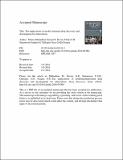Files in this item
The implications of model–informed drug discovery and development for tuberculosis
Item metadata
| dc.contributor.author | Muliaditan, Morris | |
| dc.contributor.author | Davies, Geraint R. | |
| dc.contributor.author | Simonsson, Ulrika S. H. | |
| dc.contributor.author | Gillespie, Stephen H. | |
| dc.contributor.author | Pasqua, Oscar Della | |
| dc.date.accessioned | 2017-09-28T23:32:09Z | |
| dc.date.available | 2017-09-28T23:32:09Z | |
| dc.date.issued | 2017-03 | |
| dc.identifier | 246364035 | |
| dc.identifier | 11a2389a-88c3-4ffb-848e-68492563459c | |
| dc.identifier | 85005767694 | |
| dc.identifier | 000398139200003 | |
| dc.identifier.citation | Muliaditan , M , Davies , G R , Simonsson , U S H , Gillespie , S H & Pasqua , O D 2017 , ' The implications of model–informed drug discovery and development for tuberculosis ' , Drug Discovery Today , vol. 22 , no. 3 , pp. 481-486 . https://doi.org/10.1016/j.drudis.2016.09.004 | en |
| dc.identifier.issn | 1359-6446 | |
| dc.identifier.other | RIS: urn:89487779B371FADAB2509D5436DF587A | |
| dc.identifier.other | ORCID: /0000-0001-6537-7712/work/39477877 | |
| dc.identifier.uri | https://hdl.handle.net/10023/11755 | |
| dc.description | The research leading to these results received support from the Innovative Medicines Initiative Joint Undertaking under grant agreement n°115337, the resources of which comprise financial contributions from the European Union's Seventh Framework Programme (FP7/2007-2013) and EFPIA companies’ in kind contribution. | en |
| dc.description.abstract | Despite promising advances in the field and highly effective first-line treatment, an estimated 9.6 million people are still infected with tuberculosis (TB). Innovative methods are required to effectively transition the growing number of compounds into novel combination regimens. However, progression of compounds into patients occurs despite the lack of clear understanding of the pharmacokinetic-pharmacodynamic (PK/PD) relations. The PreDiCT-TB consortium was established in response to the existing gaps in TB drug development. The aim of the consortium is to develop new preclinical tools in concert with an in silico model-based approach, grounded in PKPD principles. Here, we highlight the potential impact of such an integrated framework on various stages in TB drug development and on the dose rationale for drug combinations. | |
| dc.format.extent | 6 | |
| dc.format.extent | 164826 | |
| dc.language.iso | eng | |
| dc.relation.ispartof | Drug Discovery Today | en |
| dc.subject | PKPD | en |
| dc.subject | Tuberculosis | en |
| dc.subject | Drug development | en |
| dc.subject | Modelling and simulation | en |
| dc.subject | RA0421 Public health. Hygiene. Preventive Medicine | en |
| dc.subject | T-NDAS | en |
| dc.subject | SDG 3 - Good Health and Well-being | en |
| dc.subject.lcc | RA0421 | en |
| dc.title | The implications of model–informed drug discovery and development for tuberculosis | en |
| dc.type | Journal article | en |
| dc.contributor.sponsor | European Commission | en |
| dc.contributor.institution | University of St Andrews. School of Medicine | en |
| dc.contributor.institution | University of St Andrews. Global Health Implementation Group | en |
| dc.contributor.institution | University of St Andrews. Gillespie Group | en |
| dc.contributor.institution | University of St Andrews. Biomedical Sciences Research Complex | en |
| dc.contributor.institution | University of St Andrews. Infection Group | en |
| dc.contributor.institution | University of St Andrews. Infection and Global Health Division | en |
| dc.identifier.doi | 10.1016/j.drudis.2016.09.004 | |
| dc.description.status | Peer reviewed | en |
| dc.date.embargoedUntil | 2017-09-28 | |
| dc.identifier.url | http://www.sciencedirect.com/science/article/pii/S1359644616303245#appd002 | en |
| dc.identifier.grantnumber | en |
This item appears in the following Collection(s)
Items in the St Andrews Research Repository are protected by copyright, with all rights reserved, unless otherwise indicated.

